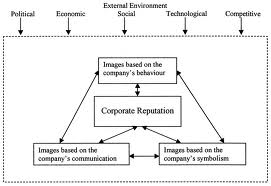It is said that a business’ reputation is all that stands between its profit and its ruin, and in the past decade, I believe that this has never been more true. Since the advent and growth of Web2.0, organisations have come under increasing levels of scrutiny from both the general public and their competitors, who would no doubt seize upon and exploit any negative press so as to advance their own corporate strategy.
According to Dahlen, “Everything and everyone communicates” (2010), with advances in technology meaning that we all now have the ability to communicate and share our opinions publicly. Social media is not only a key example of this (through websites such as Facebook, Twitter and WordPress), but in particular, has become a medium through which we can visibly see the ways we shape the content of our online personas to reflect varying aspects of our identities. In Communications, be it the marketing, advertising or public relations industry, this is an even more apparent phenomenon as we increasingly tailor our words towards different groups, altering what we say on behalf of our clients’ brands and the ways in which we say it depending on our relationship with (and knowledge of) the recipients. This can be a double-edged challenge for businesses who are expected to not only utilise digital platforms as an outlet for external communications, but also to directly communicate and have conversations with their stakeholders, particularly their customers.
In seeing the vast opportunities opened by online platforms and social media, businesses are now capitalising on and engaging more and more with social media – a recent survey found 79% have used or planned to use social media. However a 2013 study by Fishburn Hedges and Jigsaw Research exploring the changing nature of corporate narratives, found that businesses’ self-portrayals were still not sufficiently engaging to their audiences, with 20% of the general public surveyed stating that they don’t believe brand ‘stories’ at all and 52% claiming to not believe brand stories if they are conveyed through advertising and communications.
From corporate social responsibility to crisis management, effective communications between companies and their stakeholders is becoming an increasingly vital element for a successful business practice. The CIPR defines public relations as being “about reputation – the result of what you do, what you say and what others say about you. Public relations is the discipline which looks after reputation, with the aim of earning understanding and support and influencing opinion and behaviour. It is the planned and sustained effort to establish and maintain goodwill and mutual understanding between an organisation and its public.”
This is corroborated by Simon Matthews, Chief Executive of Fishburn Hedges, who said: “Audiences can see right through business messages that don’t correlate with corporate behaviour. Corporate communications has an opportunity to help unify different organisational voices and bridge the gap between them to be a force for cultural good within the business.”
It’s no longer enough to shout about how amazing you are on social media, the public (particularly young people) are becoming increasingly savvy in spotting companies whose behaviour doesn’t live up to its advertising. McDonald’s for example, is currently spiralling into a long-predicted reputational crisis where its recurrent US labour law violations and unappetising news reports on food content and quality has led to significantly sagging sales. To quote Jim Hightower, “You know your business has what image consultants call “quality perception issues” when you have to launch a PR initiative that publicly addresses such questions as: “Does McDonald’s beef contain worms?”
McDonald’s is paying the price for its lack of corporate and communicational consistency, and is left on the defensive in trying to mitigate some of the negative publicity it now faces. If they had instead taken a proactive approach in identifying and approaching their stakeholders, they would have been able to categorise them based on either Mendelow’s Power and Influence Matrix or Mitchell, Agle and Wood’s Salience Model, and establish, not only their motivations and areas of concern, but also the best ways in which to manage or engage. Instead the brand is left scrambling to distract from its poor media coverage through a new ad campaign centred on linking its Golden Arches to the healing power of ‘love’.
Without changing to more fair and equal corporate practices though, I’m hesitant in thinking that anyone will be Lovin’ this brand’s attempts to regain it’s reputation.
